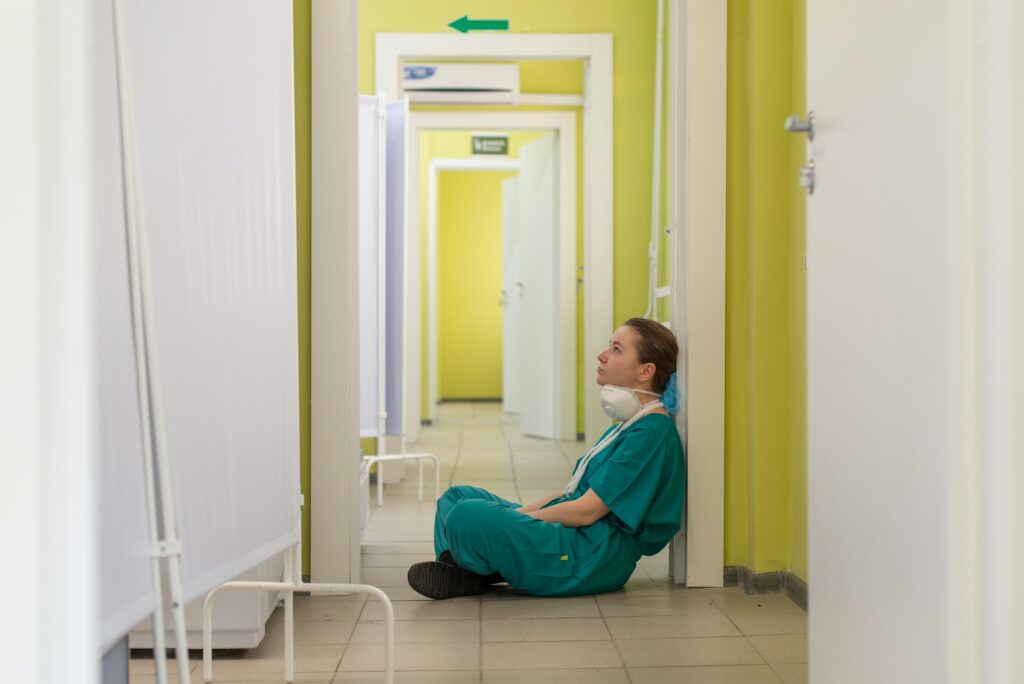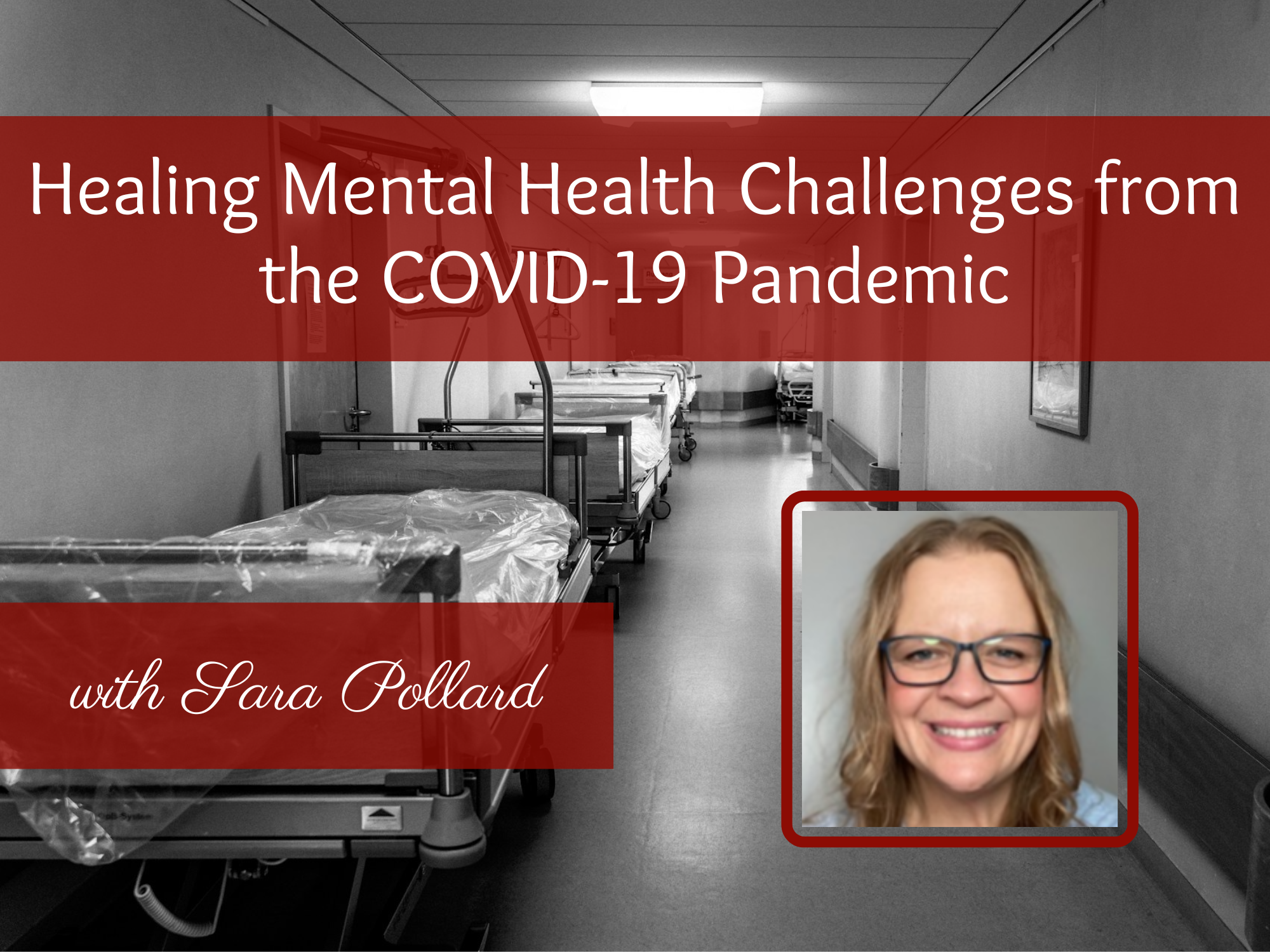It’s 2:00am in the ICU. A nurse stares at a monitor, watching her patient’s oxygen levels dip dangerously low. She’s exhausted, running on adrenaline and coffee, and each time she closes her eyes, she sees the faces of all the other patients who came before.
Down the hall, a family member sits alone in a waiting room, wringing their hands and praying for a miracle. It’s been days since they had more than a few hours of rest or a home-cooked meal. They’ve seen intubations and ventilators, listened to doctors deliver devastating news, and spent many long days hoping and hurting.
For thousands of patients, health care workers and caregivers, scenes like these weren’t uncommon during the worst of the COVID-19 pandemic in 2020 and 2021. Today, these memories remain vivid and unrelenting, affecting mental and emotional health in ways that are difficult to understand if you haven’t experienced it yourself. But one of our team members knows this weight firsthand.
Kenosis therapist Sara Pollard (MSN, RN, PMHNP-BC) experienced her own COVID-19 nightmare when her husband fell critically ill in December 2021. After months in the hospital and a harrowing road to recovery, Sara came away changed, carrying a new mission: to help other caregivers and healthcare professionals process and heal from the trauma of similar experiences.
With the winter flu season nearly here, we thought now was the perfect time to speak with Sara about the challenges of post-COVID trauma and some practical, compassionate ways that survivors can find healing in the aftermath.

Sara’s Story of COVID-19 Trauma
Sara’s story of trauma and healing from COVID-19 began in late December 2021, when her husband—a previously healthy 47-year-old man—was admitted to the hospital with bilateral pneumonia. The rapid progression of his illness left Sara and her family stunned and overwhelmed. On Christmas Day, he was placed on a ventilator in the ICU, fighting for his life.
“We all were affected by the COVID-19 pandemic,” Sara says, “but some people in a more intimate way. For us, it was up close and personal.”
At his most critical moments, Sara stood by her husband’s side, watching his monitors and listening to the chorus of machines that had become his lifeline. Although he was sedated and unaware of what was happening, Sara was fully conscious of the surrounding realities. As she watched the care teams rush to manage his condition, she caught sight of other patients in neighboring rooms, each facing their own battle against the virus. “I would try to walk down the hallway and not look, but sometimes my eyes would creep over,” she recalls.
The emotional rollercoaster continued for months. In mid-January, her husband’s lung collapsed, necessitating that he be intubated a second time. At one point, Sara and her family signed a “do not resuscitate” order, fearing that he wouldn’t make it through his ordeal. But in spite of everything, Sara found herself holding onto faith. “We are Christians, and I got a word from the Holy Spirit through two close friends that told me that wasn’t what we were supposed to do,” she says.
In the end, he was fortunate enough to make a full, if slow, recovery. After 81 long days, he was discharged from the hospital, and the couple returned home together, shaken but grateful. “By the grace of God, he is doing great,” Sara says.
But even after her husband’s recovery, Sara struggled to process the trauma she had witnessed. Although he had little memory of his hospital stay, Sara still carried the images and emotions vividly. “He doesn’t remember the vast majority of what occurred,” she explains. “I, unfortunately, do.”
In the months and years that followed, Sara was able to transform her pain into purpose. She felt a profound shift, a calling to do more for the many others who had undergone similar experiences as caregivers or healthcare workers on the front lines. “After lots of work healing from a mental health and spiritual perspective, I found a need and a passion for patients, healthcare providers, families and caregivers to have a place to process,” she says.
In her practice at Kenosis Counseling Center, Sara now sees a growing number of clients who worked as health care professionals during the pandemic, as well as patients who had COVID-19 and their family members. She finds that her personal experience gives her a unique perspective on the needs of those carrying COVID-related trauma.
“When you’ve had this experience, you protect others by not sharing the gruesome, horrible details,” she says. “People don’t need to put that face on with me. I get it.”

Common Mental Health Challenges Among COVID-19 Survivors
The emotional weight carried by patients, healthcare workers and caregivers during the pandemic is undeniable. Many still grapple with trauma-related mental health challenges, which can manifest in a variety of ways.
Sara explains, “As mental health clinicians, we use diagnoses a lot, but diagnoses are really just constellations of symptoms.” Some of the most common symptoms that individuals may experience include:
Feeling on Edge or Hypervigilant
Sara often hears from clients who feel constantly “on edge” or unable to relax. “There’s a general feeling of fight or flight, or even frozen and numb,” she says. This can be experienced as irritability, sadness, or a belief that the world is a universally dangerous place. As one might expect, these feelings can be deeply troubling to deal with day after day.
Intrusive Traumatic Memories
Recollections of traumatic events affect the brain differently than other memories. Sara explains, “Traumatic memories are unwanted, intrusive, and repetitive. They come when they want to.” Sensory triggers such as smells or sounds can cause the body to react as though it is still in the traumatic situation, even when the mind knows it is safe.
Sleep Disturbances and Nightmares
“Sleep disturbances are another huge one,” Sara notes. Many caregivers find themselves unable to fall asleep, having vivid nightmares, or waking suddenly into a hyper-alert state. These sleep disruptions can compound the emotional exhaustion that often comes along with caregiving roles.
Emotional Numbness and Relationship Strain
Numbness or detachment from emotions is common, as is relationship discord. “It’s not unusual at all for partners or spouses to start having some conflict,” Sara explains, especially when one partner is unable to empathize with the other’s emotional burden.
Spiritual Struggles
Many who witnessed others suffer during the pandemic came away with distressing spiritual questions. Many wonder, “How does a God who is good allow something like this?” or, “Where was God in the midst of my suffering?” This is a common struggle for those who turn to their faith during times of crisis, and it can leave caregivers feeling lost and abandoned.

Paths to Healing and Recovery
Recovery from the psychological toll of COVID-19 is a process that requires time, self-care, and sometimes professional help. Sara emphasizes the importance of reaching out for support and offers the following strategies for healing:
Talk to Someone You Trust
As human beings, we have a deep-seated need to share our experiences with other people. The simple act of talking to someone you trust can do a world of good when healing from trauma. Sara advises, “Who in your life is a safe person that you can talk to about feelings? Is that a co-worker? Is that a friend? Is that your spouse? Talk to them. Don’t keep it in.”
Prioritize Physical and Mental Health
When working on your emotional health, it’s important to maintain a good foundation for brain and body wellness, too. “I cannot emphasize enough: healthy food, sleep hygiene, sunlight, movement,” Sara says. Simple lifestyle changes like eating whole foods, exercising, and reducing alcohol and caffeine intake can support mental well-being.
Consider Holistic Health Approaches
“I’m a big believer in holistic medicine,” Sara says. Whether through diet, supplements, or medications that reduce inflammation, there are many ways to support mental and emotional recovery. “If it’s been a while since you’ve had a physical with your doctor, go in for a physical. Get some blood work done. Have a thyroid panel. Look at everything comprehensively.”
Seek Spiritual Support and Space for Honest Lament
If you are religious, Sara recommends bringing your questions, doubts, and feelings before God, noting that this kind of honest lament can be a crucial step in spiritual healing. “I learned a lot about being real before the Lord, and saying, ‘I’m struggling and I’m traumatized,’ ” Sara shares. Finding community with others who understand this process, whether through prayer groups or faith-based counseling, can also provide valuable support.
Seek Professional Counseling
Last but certainly not least, therapy can be incredibly helpful for individuals who are struggling with trauma. “I’m trained in a specific modality called EMDR and another modality called the Flash Technique. They’re both trauma-focused modalities,” Sara explains. Therapies such as these have been shown to help individuals process and heal from painful memories.

